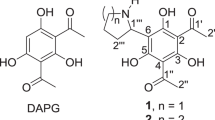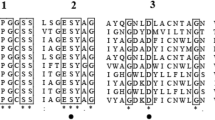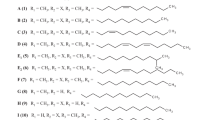Abstract
PENICILLIN acylase (E.G. 3.5.1.11) hydrolyses penicillins to give 6-aminopenicillanic acid (6APA). It has been found together with the side-chain organic acid in various microorganisms1–7. Several strains of E. coli have been found with a significant intracellular splitting activity on benzylpenicillin8–10. The characteristics of the enzyme responsible for this splitting activity have been investgated both in collected intact cells2,9,11–13 and in crude enzyme preparations14–17.
This is a preview of subscription content, access via your institution
Access options
Subscribe to this journal
Receive 51 print issues and online access
$199.00 per year
only $3.90 per issue
Buy this article
- Purchase on Springer Link
- Instant access to full article PDF
Prices may be subject to local taxes which are calculated during checkout
Similar content being viewed by others
References
Sakaguchi, K., and Murao, S. J., Agric. Chem. Soc. Japan, 23, 411 (1950).
Rolinson, G. N., Batchelor, F. R., Butterworth, D., Cameron-Wood, J., Cole, M., Eustace, G. C., Hart, M. V., Richards, M., and Chain, E. B., Nature, 187, 236 (1960).
Cole, M., and Rolinson, G. N., Proc. Roy. Soc., B, 154, 490 (1961).
Erickson, R. C., and Bennet, R. E., Bact. Proc., 65 (1961).
Huang, H. T., Seto, T. A., and Shull, G. M., App. Microbiol., 11, 1 (1963).
Waldschmidt-Leitz, E., and Bretzel, G., Hoppe-Seyler's Z. Physiol. Chem., 337, 222 (1964).
Nyiri, L., Acta Microbiol. Acad. Sci. Hung., 10, 261 (1963).
Kaufmann, W., and Bauer, K., British patent 893, 418 (1959).
Kaufmann, W., and Bauer, K., Naturwiss., 47, 474 (1960).
Szentirmai, A., App. Microbiol., 12, 185 (1964).
Cole, M., Nature, 203, 519 (1964).
Kaufmann, W., Biochem. Biophys. Res. Commun., 14, 458 (1964).
Kaufmann, W., and Bauer, K., Nature, 203, 520 (1964).
Murao, S., and Kishida, Y., J. Agric. Chem. Soc. Japan, 35, 607 (1961).
Borkar, P. S., Vinze, V. L., and Sen, G., Hind. Antibiot. Bull., 4, 152 (1961).
Holt, R. J., and Stewart, G. T., Nature, 201, 824 (1964).
Szentirmai, A., Acta Microbiol. Acad. Sci. Hung., 12, 395 (1965).
Cole, M., and Sutherland, R., J. Gen. Microbiol., 42, 345 (1966).
Zsupán, K., and Juhosné, T., Antibiotiki (Moscow), 11, 491 (1966).
Author information
Authors and Affiliations
Rights and permissions
About this article
Cite this article
NYIRI, L. Change in the Rate of Deacylation of Benzylpenicillin and Phenylacetyl Glycine during Submerged Cultivation of Escherichia coli. Nature 214, 1347–1349 (1967). https://doi.org/10.1038/2141347a0
Received:
Revised:
Issue Date:
DOI: https://doi.org/10.1038/2141347a0
This article is cited by
-
Properties of the purified penicillin V-acylase ofErwinia aroideae
Experientia (1975)
Comments
By submitting a comment you agree to abide by our Terms and Community Guidelines. If you find something abusive or that does not comply with our terms or guidelines please flag it as inappropriate.



